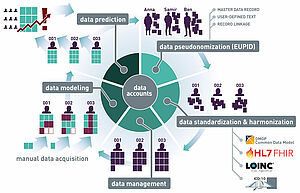Medical care is facing a digital transformation: AIT's newly developed Health Data Space Nodes allow decentralised patient data from various healthcare facilities such as GP practices, diagnostic centres and hospitals to be brought together. Data protection and data interoperability form the basis for the development of effective AI-supported diagnostic tools.
In the current healthcare infrastructure, patient data is distributed across various systems and often cannot be integrated due to legal and technical hurdles. Data protection concerns and the lack of interoperability between the various data systems prevent this valuable information from being utilised efficiently. This poses a particularly serious problem for the development of AI-based prognostic models based on holistic data sets.
Health Data Space Nodes from AIT
The Health Data Space Nodes developed by AIT offer a solution by harmonising data from different sources to a unified data model and standard vocabulary using special algorithms. Martin Baumgartner, Digital Health Team of the AIT Center for Health and Bioresources explains: "This technology addresses important aspects of data protection through advanced de-identification procedures that protect patient information while making it usable for research purposes. In addition, the nodes enable the cleansing, visualisation and annotation of the data, which significantly increases its quality and informative value."
With projects such as "D4Health Tirol", together with the Tirol Kliniken, the Digital Health Group of the AIT Center for Health and Bioresources is demonstrating its leading role in the application of data science for medical innovations. In the specific case of the "D4Health Tirol Heart Failure Registry", data from over 5,000 patients has already been successfully integrated and analysed, demonstrating the performance and reliability of the Health Data Space Nodes.
Precise predictions prevent emergencies and improve quality of life
"The introduction of the Health Data Space Nodes aims to contribute to a comprehensive evolution in healthcare. Future developments and applications promise not only improved diagnostic models, but also a more precise prediction of patient outcomes," says Baumgartner. For example, the treatment of heart failure could be supported by models for the early detection of complications, thereby preventing emergencies and significantly improving quality of life.
The AIT plans to expand this solution and extend it to other medical fields in order to fully utilise the potential of AI and take patient care to a new level.
More on the topic: https://www.frontiersin.org/articles/10.3389/fmed.2024.1301660/full
About the author: Martin Baumgartner is a PhD student at Graz University of Technology under the supervision of Günter Schreier. He is researching methods for applying artificial intelligence to health data with an increased focus on patient privacy ("privacy-preserving AI") and data protection. His field of activity also includes biosignal processing and various teaching activities at various Austrian universities. In Digital Doctor Magazine, Martin Baumgartner reports on pioneering digital solutions in medicine: https://www.medmedia.at/digitaldoctor/modern-talking-sprachsynthese-mit-ki-neuroprothesen/ (German)




